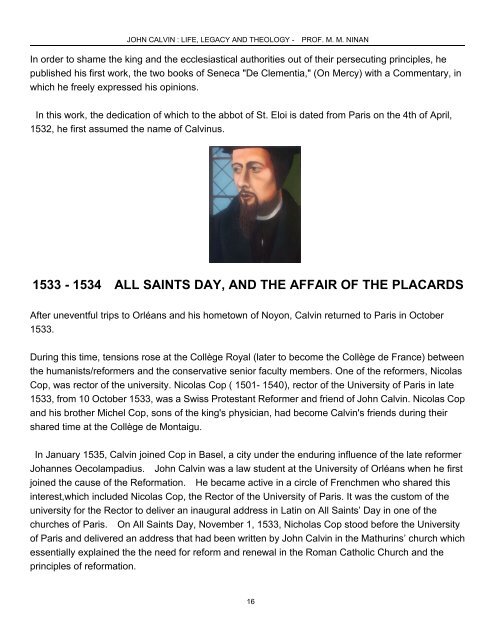Create successful ePaper yourself
Turn your PDF publications into a flip-book with our unique Google optimized e-Paper software.
JOHN CALVIN : LIFE, LEGACY AND THEOLOGY -<br />
PROF. M. M. NINAN<br />
In order to shame the king <strong>and</strong> the ecclesiastical authorities out of their persecuting principles, he<br />
published his first work, the two books of Seneca "De Clementia," (On Mercy) with a Commentary, in<br />
which he freely expressed his opinions.<br />
In this work, the dedication of which to the abbot of St. Eloi is dated from Paris on the 4th of April,<br />
1532, he first assumed the name of <strong>Calvin</strong>us.<br />
1533 - 1534 ALL SAINTS DAY, AND THE AFFAIR OF THE PLACARDS<br />
After uneventful trips to Orléans <strong>and</strong> his hometown of Noyon, <strong>Calvin</strong> returned to Paris in October<br />
1533.<br />
During this time, tensions rose at the Collège Royal (later to become the Collège de France) between<br />
the humanists/reformers <strong>and</strong> the conservative senior faculty members. One of the reformers, Nicolas<br />
Cop, was rector of the university. Nicolas Cop ( 1501- 1540), rector of the University of Paris in late<br />
1533, from 10 October 1533, was a Swiss Protestant Reformer <strong>and</strong> friend of <strong>John</strong> <strong>Calvin</strong>. Nicolas Cop<br />
<strong>and</strong> his brother Michel Cop, sons of the king's physician, had become <strong>Calvin</strong>'s friends during their<br />
shared time at the Collège de Montaigu.<br />
In January 1535, <strong>Calvin</strong> joined Cop in Basel, a city under the enduring influence of the late reformer<br />
Johannes Oecolampadius. <strong>John</strong> <strong>Calvin</strong> was a law student at the University of Orléans when he first<br />
joined the cause of the Reformation. He became active in a circle of Frenchmen who shared this<br />
interest,which included Nicolas Cop, the Rector of the University of Paris. It was the custom of the<br />
university for the Rector to deliver an inaugural address in Latin on All Saints’ Day in one of the<br />
churches of Paris. On All Saints Day, November 1, 1533, Nicholas Cop stood before the University<br />
of Paris <strong>and</strong> delivered an address that had been written by <strong>John</strong> <strong>Calvin</strong> in the Mathurins’ church which<br />
essentially explained the the need for reform <strong>and</strong> renewal in the Roman Catholic Church <strong>and</strong> the<br />
principles of reformation.<br />
16

















